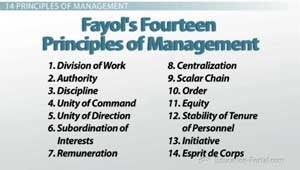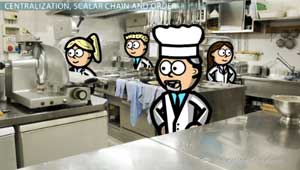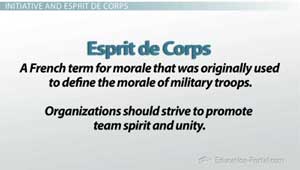Fayol's Theories on Staff Management and Worker Satisfaction
After you watch the video and know the material, click HERE for the quiz.
In this lesson, we'll discuss how Henri Faylol's final seven principles play out in the workplace. Using a professional restaurant kitchen as an example, you'll learn about the importance of worker satisfaction and other elements of effective management.
14 Principles of Management
In a previous lesson, we learned that Fayol, while working in mines in France, discovered that managers did not have the right tools to manage workers in an effective way. As a result, Fayol developed 14 principles that addressed the organization as a whole including both the work and the worker.
 |
- Division of Work
- Authority
- Discipline
- Unity of Command
- Unity of Direction
- Subordination of Individual Interests to the General Interest
- Remuneration
- Centralization
- Scalar Chain
- Order
- Equity
- Stability of Tenure of Personnel
- Initiative
- Esprit de Corps
Review of Principles 1-7
To review, Fayol believed by dividing the work into specialized and specific jobs, workers are able to work more efficiently. Small management units who oversee functional areas of the organization are now able to assign work and hold workers accountable for their production. This makes it easier to measure productivity. Once a system of accountability is in place and productivity can be monitored, it is easier to determine who is performing and who is not performing. Managers are able to selectively and individually discipline workers who fall short of goals quickly and in the correct measure. Having just one manager assigned to a team takes away any task confusion. Workers have only one supervisor directing them. With only one supervisor directing work, it is easy to motivate employees to buy into one plan. This minimizes self-interest. With only one manager managing the work of one team who share one vision, compensating the team can be done fairly.
Principles 8-14
The following 7 principles focus on the decision-making process, hierarchy, hygiene, employee satisfaction, motivation, and team spirit. We will focus on how a professional kitchen might apply these 7 principles.
 |
Centralization
This principle refers to how close employees are to the decision-making process. It is important to aim for an appropriate balance.
A chef generally leads a professional kitchen. A kitchen staff or brigade performs the work. There are decisions that need to be made as a team and others that need to be made by the leader. Chef Fayol strikes a balance by allowing the brigade to decide the day-to-day operations, like which vegetables to cook, evening specials and plate design. However, Chef Fayol makes all of the decisions about the restaurant image, menu design, and vision because he is the owner of Bistro Fayol.
 |
Scalar Chain
Scalar chain: a term that refers to a direct chain of command in the military, ranking staff from the highest to the lowest level. Employees should be aware of where they stand in the organization's hierarchy or chain of command.
In scalar chain, Fayol knows that for centralization to even be possible, there needs to be a chain of command, and each member must be aware of their place in the hierarchy of the kitchen. Chef Fayol explains this to the brigade using an organizational chart.
 |
Order
The workplace facilities must be clean, tidy and safe for employees. Everything should be in its place.
Nobody knows better than Chef Fayol that the work area must always be clean, neat, and safe. Watch what happens when one of the brigade leaves vegetable peels on the floor near his station. Fayol explains to the brigade the dangers involved in leaving food on the floor. The brigade appreciates his guidance and work much more productively when everything is in its place.
Equity
Managers should be fair to staff at all times, both maintaining discipline when necessary and acting with kindness where appropriate.
Chef Fayol levies discipline when needed, like when the member of the brigade left the peels on the floor. However, Chef Fayol also compliments the brigade when the restaurant receives rave reviews. A food critic reviewed Bistro Fayol. One of the cooks was mentioned as the most talented young chef in town. Chef Fayol gave the cook a plaque to hang on his wall. In all fairness, Chef Fayol also gave the other members smaller plaques for assisting in the effort.
Stability of Tenure of Personnel
Managers should strive to minimize employee turnover. Personnel planning should be a priority.
Chef Fayol knows that Bistro Fayol is only as good as a sum of its parts or members. He is always thinking of ways to reduce turnover. Having the brigade members quit their jobs is costly and a disruption to the workflow. Others in the brigade would have to pitch in areas of the kitchen. This will disrupt the flow of work. Kitchen staff may not be working in areas of specialization. This may reduce the quality of the food and affect productivity. He always tries to maintain a healthy work balance for his members.
Initiative
Employees should be given the necessary level of freedom to create and carry out plans.
Chef Fayol, in this example, allows members of the brigade to try new recipes and even allows the brigade members to create their own specials from time to time, but he reminds the members of Principle 6: no one member can place his self-interest above the interest of the bistro. They understand.
Esprit de Corps
 |
A French term for morale that was originally used to define the morale of military troops. Organizations should strive to promote team spirit and unity.
Chef Fayol knows that when the team feels happy, they are more motivated to perform. He also knows that when the team feels part of a special group, they are more excited about their jobs. Chef Fayol and the brigade always work on ways to unify their positive spirit. Sometimes, Chef Fayol cooks a large family meal for his brigade.
Lesson Summary
In summary, Fayol believed that allowing workers to be part of the decision-making when appropriate is important for the overall organization. When roles are clearly defined and a chain of command is clear and present, workers understand their role in the organization. A clean and safe work environment increases worker satisfaction. The same theory applies to reward systems. Discipline and rewards should be administered appropriately and in the right measure. This will reduce turnover. Employees will feel empowered as a team to take healthy risks. As a result, organizational objectives can be met.